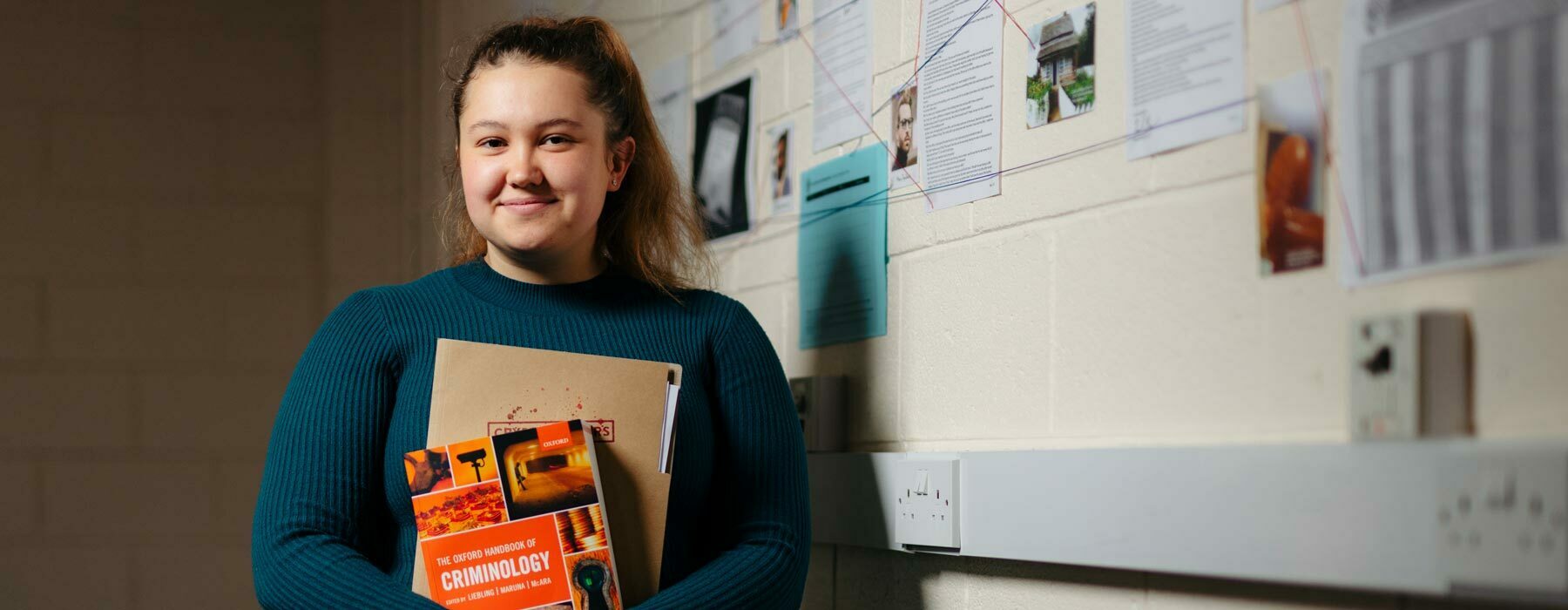
Higher Education Certificate in Criminology with Psychology
Apply today Enquire about this course Download PDFJump to
Subject
Criminology and Psychology
Level
Level 4
Duration
1 year full-time/2 years part-time
Start Date
September 2025
UCAS Course Code
CECP
The course
The aim of the HE Certificate Criminology with Psychology is to prepare students for roles in both the Criminal Justice System and independent investigation organisations through theory and applied processes. The programme encourages professionalism in industry and develops skills required by employers, whilst supporting new policies and procedure.
Course Information
- Appraising and utilising knowledge and understanding of historical and cultural criminological and psychological theory in real-world problems
- Sourcing, selecting, retrieving, and managing research information to inform the development and delivery of an agreed outcome
- Using digital information and communication technologies effectively
- Communicating facts, employing a range of presentation of findings and discipline-specific materials and processes to articulate information verbally, visually and literacy
- Engaging with challenging and unfamiliar situations in an ethical and reflective manner
- Appraising practical and theoretical concerns within psychology, practicing effective and ethical information control.
- Applying the principles of environmental and sustainable design in a social setting, reduce crime, improve community cohesion and increase awareness of sustainability.
- Developing skills for successful decision making in work-related and work-based contexts, and for career planning, progression and personal development
- Social Science Skills
- Understanding the Societal Consequences of Criminal Behaviour
- Essential Criminology
- Foundations of Psychology
- Crime Scene Management with Forensics
- Professionalism in Industry
You will need:
A minimum of 48 UCAS points
OR
A relevant BTEC Level 3 and significant industry experience
Plus: GCSE English Grade 4 or above or equivalent and a suitable reference
UCAS points may be from qualifications such as T Levels, A Levels, BTEC Level 3 Extended Diplomas, Access to Higher Education Diplomas, and City and Guilds Advanced Technical Diplomas amongst others. Please use the UCAS Tariff points calculator to determine the UCAS points value of your qualifications.
Life and/or experience of non-traditional students will be taken into account when considering applications. The successful completion of an entry task may be required when considering applications without the required formal entry qualifications.
If an applicants first language is not English, or a Tier 4 student visa to study is required and GCSE English at grade 4/C or equivalent is not held, they will need to evidence their English language proficiency level, such as International English Language Testing System (IELTS) 6.0 overall (with a minimum 5.5 in each skill).
Advanced entry may be possible due to prior experience or certificated learning; applicants should complete the recognition of prior learning approval process.
This programme is delivered with a variety of learning and teaching approaches to include all students learning styles and preferences. The pedagogic approach to social science education is essentially integrative and holistic, enabling the student to draw upon all learning to identify and solve complex problems.
For all modules, theory lectures are delivered that aim to deliver the core content and provide the underpinning knowledge. To complement the theory lectures, you will have group seminars that are used to reinforce concepts delivered theoretically.
The teaching methods focus on facilitating a student-centred approach to enhance the independent learning that takes place outside of the classroom.
The full-time pathway includes approximately 12 to 16 hours a week, incorporating lectures, seminars, debates and tutorials.
You are also expected to carry out a significant amount of private study in addition to contact time (25-30 hours a week).
Studying part-time you will have approximately 5-9 hours of contact time each week, including lectures, seminars, practicals and tutorials. You are also expected to carry out a significant amount of private study in addition to contact time (18-20 hours a week).
You can expect to receive your timetable during induction week.
- There may be additional costs for DBS if you are seeking additional experience within relevant sectors. The cost will be dependent on the level of check completed, and would be at your expense. You can check the current cost on the www.gov.uk website.
- A suitable electronic device, e.g. a laptop or tablet, with internet connectivity is required for accessing online learning.
- Any educational visits/trips and enrichment activities will be additional to the course fees, students will be made aware of these optional visits and associated costs as required.
- On successful completion of the programme, you will have the opportunity to graduate at a ceremony wearing formal dress. The hire of the formal dress is an additional cost.
Validated by University of Hull
We are proud to collaborate with University of Hull on the validation of this course.
This includes transforming our programmes to ensure that we meet the evolving needs of the sector, giving you the best opportunities for success when you graduate by having a competence-based focus. Find out more about competence-based higher education.
View the policies and procedures you would be agreeing to comply with by registering for this programme. This encompasses University of Hull Quality and Standards, including a Guide for Collaborative Provision students.
Financial Information
Find the full details of the fees associated with this programme and the financial support available.

